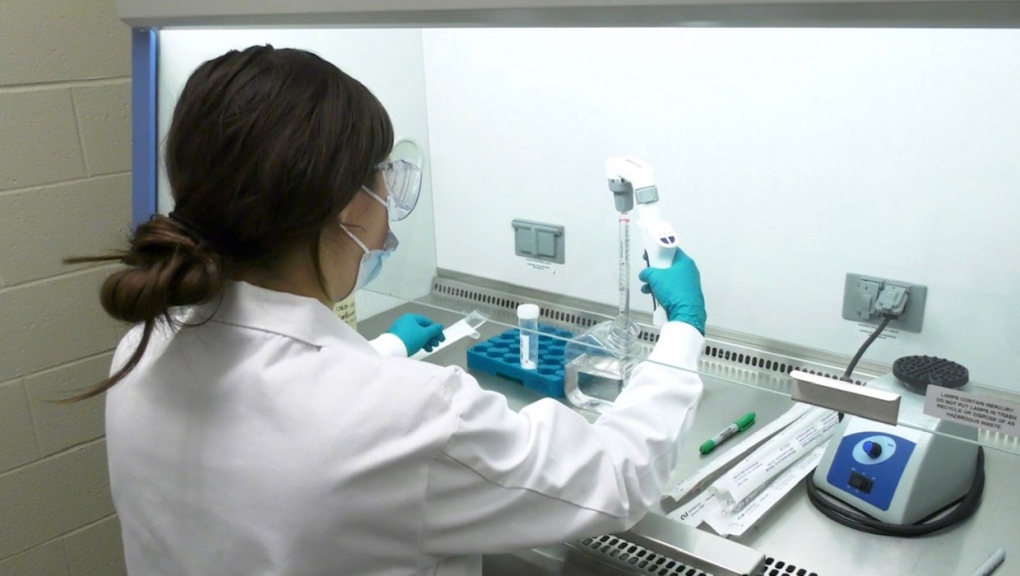Calgary's wastewater is now being tested for flu and RSV cases
Deep in south Calgary, on the site of a sprawling wastewater treatment plant, a small group of researchers are now tracking the spread of influenza and RSV in Alberta.
A group called Advancing Canadian Wastewater Assets (ACWA), made up of scientists from the city and the University of Calgary, have been testing wastewater for COVID-19 for nearly three years – now they've added additional testing during a busy respiratory virus season.
"With the rise in flu and RSV this year, we thought it's relatively straightforward to add those, so let's give Alberta Health and Albertans in general the advantage of seeing what's in the wastewater," said Kevin Frankowski, the executive director of ACWA.
The testing data is released publicly and provides a snapshot of whether cases of the respiratory viruses are going up or down in a given community.
"Having the information transparently available to all Albertans is important because it allows people to access the data on their own and make their own self risk-based decisions," Frankowski said.
Data in the last month and a half shows some reason for optimism in Calgary. Wastewater testing shows cases of influenza and COVID-19 are coming down from where they were at weeks ago, but RSV is still increasing.
"I think it is important to pay attention to predictive models for what's going to happen in the future, but I think the focus needs to be on the here and now, though," said Dr. Alika Lafontaine, an Alberta doctor and the head of the Canadian Medical Association.
"We know emergency rooms are being overfilled," he said, pointing out that while the wastewater data may be trending down, it's coming down from high levels after an especially difficult start to flu season in the province.

The respiratory virus season has been especially hard on young people and children's hospitals in the province. Alberta Health Services has had to redirect some staff to deal with hospitals that are exceeding 100 per cent capacity.
Lafontaine is advocating for stronger public health measures and more messaging to encourage people to get vaccinated and stay home if they're sick.
"Stress in health care really rolls down hill and it rolls down onto the shoulders of the people that provide care and the people who need care," he said.
CTVNews.ca Top Stories

NEW After hearing thousands of last words, this hospital chaplain has advice for the living
Hospital chaplain J.S. Park opens up about death, grief and hearing thousands of last words, and shares his advice for the living.
BREAKING Police cordon off Iran consulate in Paris where man threatens to blow himself up: French media
French police cordoned off the Iranian consulate in Paris on Friday, where a man was threatening to blow himself up, Europe 1 radio and BFM TV.
Some Canadian families will receive up to $620 per child today
More money will land in the pockets of some Canadian families on Friday for the latest Canada Child Benefit installment.
BREAKING Iran fires at apparent Israeli attack drones near Isfahan air base and nuclear site
An apparent Israeli drone attack on Iran saw troops fire air defences at a major air base and a nuclear site early Friday morning near the central city of Isfahan, an assault coming in retaliation for Tehran's unprecedented drone-and-missile assault on the country.
American millionaire Jonathan Lehrer denied bail after being charged with killing Canadian couple
American millionaire Jonathan Lehrer, one of two men charged in the killings of a Canadian couple in Dominica, has been denied bail.
Ottawa to force banks to call carbon rebate a carbon rebate in direct deposits
Canadian banks that refuse to identify the carbon rebate by name when doing direct deposits are forcing the government to change the law to make them do it, says Environment Minister Steven Guilbeault.
Ontario woman loses $15,000 to fake Walmart job scam
A woman who recently moved to Canada from India was searching for a job when she got caught in an online job scam and lost $15,000.
After COVID, WHO defines disease spread 'through air'
The World Health Organization and around 500 experts have agreed for the first time on what it means for a disease to spread through the air, in a bid to avoid the confusion early in the COVID-19 pandemic that some scientists have said cost lives.
Prince Harry formally confirms he is now a U.S. resident
Prince Harry, the son of King Charles III and fifth in line to the British throne, has formally confirmed he is now a U.S. resident.
































